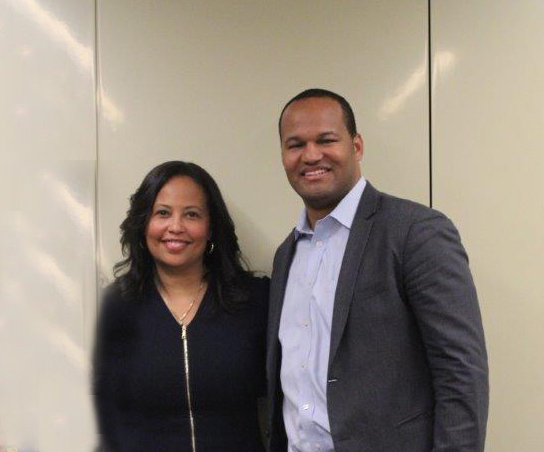Kimberly Banks MacKay, Head of US Legal for Novartis Business Services, was a corporate finance associate at Milbank early in her legal career. She has gone on to increasingly prominent roles in-house, and recently caught up with our Diversity Committee Chair Jerome McCluskey.

Please tell us about your early career and path to Milbank.
I didn’t start out as a lawyer – I worked as a commercial banker for five years in New York City and Baltimore before going to law school. I went on to pursue my law degree at Rutgers University, and from there, I summered at Milbank.
My path is a bit unusual in that I got married in law school and had my son as a young associate. I joined Milbank in 1995, and practiced in corporate finance. I’m a planner, and I decided early on that I wanted to pursue a clerkship after Milbank, thinking that I wanted to be a law professor. The judge I ended up clerking for, Judge Joseph Greenaway (currently sitting on the 3rd Circuit Court of Appeals), got my name on a recommendation from the Dean of Rutgers Law, and offered me the position at my interview. I ended up deferring that for a year to remain at Milbank, and then left for the clerkship.
I loved working for the judge, but that experience solidified that neither litigation nor research, both of which are essential to academia, inspired me. I learned that I’m a deal lawyer at heart and that is the direction I pursued.
So following your clerkship, you decided to pursue an in-house role?
Yes, I was on the Board of the Rutgers Law School alumni association and someone else on the Board passed my resume along to an executive at Lucent Technologies, where I was offered a corporate counsel position. It was unusual for them to bring me on so early in my career, but because of my background in both banking and law, they made an exception.
Your early in-house positions were with Lucent and MetLife. How familiar were you with the telecom and insurance industries when you joined?
At Lucent, I was very much a securities lawyer, a continuation of my work at Milbank. Mainly, my role required that I know how to raise money. I never knew how they made the widgets at Lucent! Then I joined MetLife, and I wasn’t familiar with the insurance business, either. But in both, I was able to offer the skills in securities law I’d developed at Milbank, and I ended up working on all sides of capital markets transactions.
Following MetLife, you joined Novartis, where you’ve been for over a dozen years now. How did you end up at a big pharma company like Novartis?
I had spread the word with my networks that I was looking for a new role.
I knew someone who was leaving her position at Novartis, and she shared my information with the General Counsel. My best opportunities have always come through relationships, not applying for roles. This is particularly true when
you’re going into an area that’s new for you.
Like at Lucent and MetLife, you entered an industry you hadn’t had much experience with.
Yes, one of my friends gave me the best advice, which was: “They’re not hiring you for what you know, they’re hiring you for your judgment.” I’m always encouraging people to forget about qualifications and focus on capabilities. You can be very qualified, have worked on all the right deals, but when I’m interviewing you, I want to know about how you develop strategy, how you implement change, and your comfort level with risk and uncertainty. Those are the kinds of things that are going to allow me to trust you to get things done in a dynamic, innovative environment.
We also emphasize that professional development is all about stretch opportunities. You probably remember this from Milbank; as a second-year, I recall my mentors putting me in unfamiliar positions, like leading a call, and feeling eminently unprepared. But that’s what forges you as a lawyer, right?
Yes, it shows you what you’re made of, but it also builds your confidence with uncertainty. I think the thing that lawyers can struggle with the most is that they want certainty – the statute says this, check that box, etc. But not having the answer is a daily occurrence in my role. Being able to synthesize information very quickly, and being comfortable saying, “I don’t know, but here’s what I would do,” is not something we’re trained to do in law school, but you have to be able to do it on a daily basis as a General Counsel. That is stimulating to some people, paralyzing to others. If it’s paralyzing, this is not the type of job for you.
This isn’t limited to in-house lawyers. A law firm is still a business. People who are really successful in law firms like Milbank understand how to drive change and move the business forward. As we in the legal profession look to define the law firm model of tomorrow, managing through change is really critical to the success of firms as well as the individuals within them.

